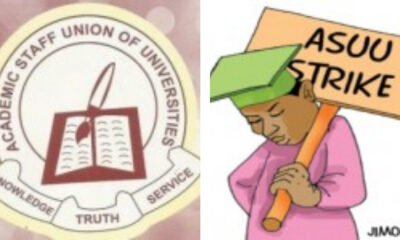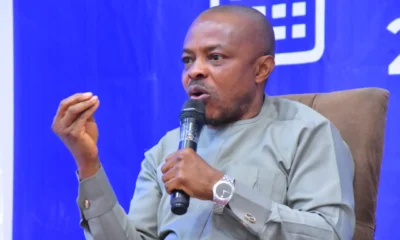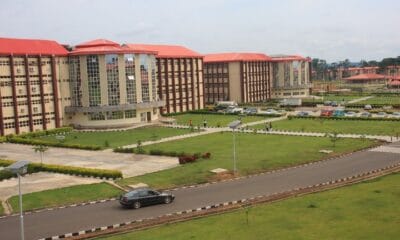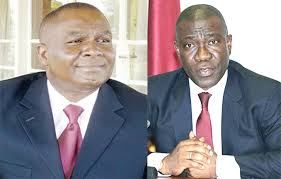Breaking News
Universities shut down nationwide as ASUU strike grounds academic activities

Academic activities were on Monday paralysed in most public universities across Nigeria following total compliance by members of the Academic Staff Union of Universities (ASUU) with the union’s two-week warning strike.
The industrial action, which officially commenced on Monday, followed the expiration of the union’s ultimatum to the Federal Government, marking another round of tension between lecturers and authorities over unresolved issues bordering on welfare, funding, and implementation of past agreements.
ASUU, FG Clash Over Failed Negotiations
The latest face-off came after negotiations between ASUU and the Federal Government collapsed last week.
Speaking earlier, the Minister of State for Education, Dr. Tunji Alausa, said the government had made significant progress in addressing the union’s demands.
He cited the release of ₦50 billion for Earned Academic Allowances and the inclusion of ₦150 billion in the 2025 budget for university revitalisation, to be disbursed in three tranches.
However, ASUU rejected the government’s proposal, describing it as “totally alien” to the issues discussed.
“What the government presented to us was not what we agreed upon at plenary, particularly regarding the conditions of service,” ASUU President, Prof. Chris Piwuna, said.
The union’s key demands include the conclusion of the renegotiated 2009 ASUU-FGN Agreement based on the Nimi Briggs Committee Draft (2021); release of withheld three-and-a-half months’ salaries from the 2022 strike; payment of arrears of 25-35% salary awards for 12 months; and funding for revitalisation of public universities.
ASUU also wants the government to release outstanding third-party deductions, such as pension contributions, cooperative dues, and salaries of lecturers on sabbatical and part-time engagements affected by the Integrated Payroll and Personnel Information System (IPPIS).
Campuses Deserted as Strike Begins
Across several campuses, academic activities were at a standstill on Monday.
At Moses Adasu University, Makurdi, classrooms were empty and lecture halls locked when The PUNCH correspondent visited around noon. Only a few students were seen wandering around the campus.
Ongoing semester examinations were disrupted at multiple institutions, including Nasarawa State University, Keffi; Federal University, Dutse; University of Benin; University of Nigeria, Nsukka (UNN); and University of Jos (UNIJOS).
At the Nasarawa State University, ASUU officials were seen moving from one examination hall to another, compelling students to vacate.
Some universities such as Bayero University, Kano and Abubakar Tafawa Balewa University (ATBU), Bauchi, had completed their semester examinations just before the strike began, narrowly escaping disruption.
Students across the country have expressed frustration over the repeated disruptions to their academic calendar.
A 200-level student of Moses Adasu University, Joseph Adoyi, told The PUNCH that the strike had derailed his academic plans.
“I was thinking I would be in 300 level in the next three months, but in Nigerian universities, students propose, ASUU disposes,” he lamented.
“I just pray this warning strike doesn’t extend beyond two weeks.”
Similarly, a final-year student of the Federal University, Dutse, Mary Ajegba, said the strikes had delayed her graduation.
“If not for ASUU strikes, I should be serving with NYSC by now,” she said.
“They say it’s a two-week warning strike, but experience tells me it could drag on. I wish they could find another way to resolve these issues instead of always toying with our future.”
ASUU Signals Readiness for Talks
Meanwhile, ASUU President, Prof. Chris Piwuna, on Monday said the union remains open to dialogue.
“Today, I received a call from Alhaji Yayale Ahmed, Chairman of the Federal Government Team, who is eager to resume talks,” he said during an interview on Channels Television.
“We are ready and available to discuss this matter once and for all.”
The ASUU president added that the union’s goal was not confrontation but finding a lasting solution to the recurring industrial crises in the education sector.
FG Enforces ‘No Work, No Pay’ Policy
In response to the strike, the Federal Government has directed all Vice-Chancellors of federal universities to enforce the “No Work, No Pay” policy.
The directive was contained in a circular dated October 13, 2025, and signed by Dr. Tunji Alausa, who instructed universities to withhold salaries of lecturers participating in the industrial action.
The circular also mandated VCs to conduct a roll call and physical headcount of academic staff still performing their duties.
“Salary payment for the period of work stoppage must be withheld from those who fail to perform their duties,” the statement read.
Alausa further confirmed that the National Universities Commission (NUC) had been directed to monitor compliance and submit a comprehensive report within seven days.
Uncertainties
As the warning strike enters its first week, uncertainty looms over when public universities will resume full operations.
While the Federal Government insists it has met most of ASUU’s demands, the union maintains that unresolved issues, particularly around funding, salaries, and autonomy, remain at the heart of the dispute.
For thousands of Nigerian students, however, the latest impasse has become an all-too-familiar story.
“We just want to graduate and move on with our lives,” said Adoyi. “Every time ASUU goes on strike, we pay the price.”
























